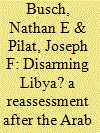| Srl | Item |
| 1 |
ID:
119455


|
|
|
|
|
| Publication |
2013.
|
| Summary/Abstract |
In 2011, several months after a popular revolt overturned the Gaddafi regime in Libya, Libya's new National Transitional Council announced the discovery of what was later confirmed to be an undeclared stockpile of chemical weapons. This was a startling announcement to many observers, since Libya had publicly renounced its weapons of mass destruction (WMD) programmes in 2003 and had apparently dismantled the programmes soon after.
Although the Libyan case had repeatedly been referred to as a positive 'model' for nonproliferation - an instance where a country had voluntarily and peacefully rolled back its WMD programs - this recent discovery forces us to wonder whether the Libyan 'model' really was as successful as initially described.
This article examines the successes, challenges and lessons that can be learned from the Libyan case of WMD renunciation and verification. As one model of cooperative verification, the Libyan case highlights not only the opportunities afforded by monitoring and verification regimes, but also some of the difficulties that any such regime will encounter in real-world circumstances, however positive.
|
|
|
|
|
|
|
|
|
|
|
|
|
|
|
|
| 2 |
ID:
119453


|
|
|
|
|
| Publication |
2013.
|
| Summary/Abstract |
Qatar has become an Arab country with a high international profile and an ambitious foreign policy, particularly as a result of its role in the Arab Spring. It has cultivated a reputation as a political mediator and a key source of foreign aid. Following the Libyan uprising, Qatar demonstrated further political adaptability in leading regional action against the Gaddafi regime.
However, this foreign policy does not appear to be built on long-term planning, but rather seems centred on opportunism and promiscuity as Qatar engages with multiple, often clashing, actors and plays the role of political maverick in the Middle East. This article assesses the key components of Qatari foreign policy, as well as public diplomacy, highlighting the potential implications of the lack of a coherent foreign strategy for the country, both on the domestic and external fronts.
Domestically, Qatar faces increasing pressure for reform and the prospect of instability, both catalyzed by high centralization of decision-making with regard to Qatari policy. Externally, it risks overextending its network of political partners to involve potentially volatile actors, losing the credibility of its public diplomacy messages, and subsequently, international scepticism towards its foreign policy motives.
Those domestic and external factors highlight the limits of relying on pragmatism in Qatari foreign policy and the need for long-term strategy if Qatar is to maintain its leadership role in the Middle East.
|
|
|
|
|
|
|
|
|
|
|
|
|
|
|
|